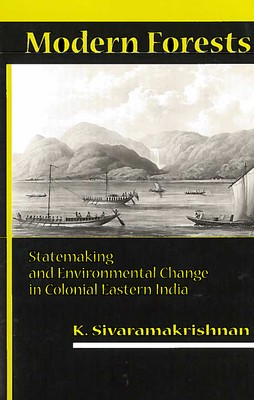Modern Forests: Statemaking and Environmental Change in Colonial Eastern India

Modern Forests: Statemaking and Environmental Change in Colonial Eastern India
Modern Forests is an environmental, institutional, and cultural history of forestry in colonial eastern India. By carefully examining the influence of regional political formations and biogeographic processes on land and forest management, this book offers an analysis of the interrelated social and biophysical factors that influenced landscape change. Through a cultural analysis of powerful landscape representations, Modern Forests reveals the contention, debates, and uncertainty that persisted for two hundred years of colonial rule as forests were identified, classified, and brought under different regimes of control and were transformed to serve a variety of imperial and local interests.
The author examines the regionally varied conditions that generated widely different kinds of forest management systems, and the ways in which certain ideas and forces became dominant at various times. Through this emphasis on regional socio-political processes and ecologies, the author offers a new way to write environmental history. Instead of making a sharp distinction between third-world and first-world experiences in forest management, the book suggests a potential for cross-continental comparative studies through regional analyses.
The book also offers an approach to historical anthropology that does not make apolitical separations between foreign and indigenous views of the world of nature, insisting instead that different cultural repertoires for discerning the natural, and using it, can be fashioned out of shared concerns within and across social groups. The politics of such cultural construction, the book argues, must be studied through institutional histories and ethnographies of statemaking. In conclusion, the author offers a genealogy of development as it can be traced from forest conservation in colonial eastern India.
PRP: 274.87 Lei
Acesta este Pretul Recomandat de Producator. Pretul de vanzare al produsului este afisat mai jos.
247.38Lei
247.38Lei
274.87 LeiLivrare in 2-4 saptamani
Descrierea produsului
Modern Forests is an environmental, institutional, and cultural history of forestry in colonial eastern India. By carefully examining the influence of regional political formations and biogeographic processes on land and forest management, this book offers an analysis of the interrelated social and biophysical factors that influenced landscape change. Through a cultural analysis of powerful landscape representations, Modern Forests reveals the contention, debates, and uncertainty that persisted for two hundred years of colonial rule as forests were identified, classified, and brought under different regimes of control and were transformed to serve a variety of imperial and local interests.
The author examines the regionally varied conditions that generated widely different kinds of forest management systems, and the ways in which certain ideas and forces became dominant at various times. Through this emphasis on regional socio-political processes and ecologies, the author offers a new way to write environmental history. Instead of making a sharp distinction between third-world and first-world experiences in forest management, the book suggests a potential for cross-continental comparative studies through regional analyses.
The book also offers an approach to historical anthropology that does not make apolitical separations between foreign and indigenous views of the world of nature, insisting instead that different cultural repertoires for discerning the natural, and using it, can be fashioned out of shared concerns within and across social groups. The politics of such cultural construction, the book argues, must be studied through institutional histories and ethnographies of statemaking. In conclusion, the author offers a genealogy of development as it can be traced from forest conservation in colonial eastern India.
Detaliile produsului








